译林牛津版高二英语必修五unit1-知识点及语法总结
牛津译林版英语高二上学期英语必修五Unit1知识点梳理
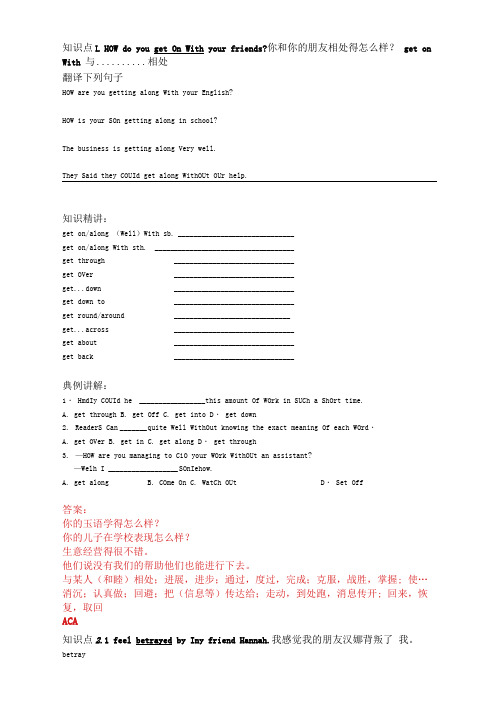
知识点L HOW do you get On With your friends?你和你的朋友相处得怎么样?get on With 与.......... 相处翻译下列句子HOW are you getting along With your English?HOW is your SOn getting along in school?The business is getting along Very well.They Said they COUId get along WithOUt OUr help.知识精讲:get on/along (Well)With sb. ______________________________get on/along With sth. ____________________________________get through _______________________________get OVer _______________________________get...down _______________________________get down to _______________________________get round/around ______________________________get...across _______________________________get about _______________________________get back _______________________________典例讲解:1・ HmdIy COUId he _________________ t his amount Of WOrk in SUCh a ShOrt time.A. get throughB. get OffC. get into D・ get down2.ReaderS Can _______ q uite Well WithOut knowing the exact meaning Of each WOrd・A. get OVerB. get inC. get along D・ get through3.—HOW are you managing to CiO your WOrk WithOUt an assistant?—Welh I __________________ SOnIehow.A. get alongB. COme OnC. WatCh OUt D・ Set Off答案:你的玉语学得怎么样?你的儿子在学校表现怎么样?生意经营得很不错。
牛津译林版高中英语必修五Unit 1《Getting along with others》单元归纳提升课件

19. admit→ admission
20.beg→begging→beggar 22.truly→ true→ truth
21. swear→ swore→ sworn 23. argue→ argument
24.apologize→ apology
25. amusement→ amused→ amusing 26.hopeless→ hope→ hopeful 27.cautious→ caution
3 . Football is very important to me , but so is our friendship. 【句式仿写】 ③——汤姆去过长城两次。——我也是。 —Tom has been to the Great Wall twice. — .
4. Although you both said cruel things to each other, one of you has to be the first to admit that it was a mistake. 【句式仿写】 ④交友的第一步是微笑。 The first step is to smile.
11. 12. 13. 14. 15. 16. 17. 18.
adj.有天赋的;有天才的 n.话题 n.态度;看法 adj.热切的;急不可待的 vi.做出反应;回应 vi.& n.停顿;暂停 adj.尽心尽力的;坚信的;坚定的 n.宽恕;仁慈
B. 词汇拓展 19. → 20. → 21. → 22. → vt.& vi.承认;允许进入;接纳 n.获准进入;入场费 vt.& vi.请求;恳求;乞讨 n.乞讨→ n.乞丐
牛津译林版高中英语必修5Unit 1Getting along with othersReading课件148张PPT课件ppt
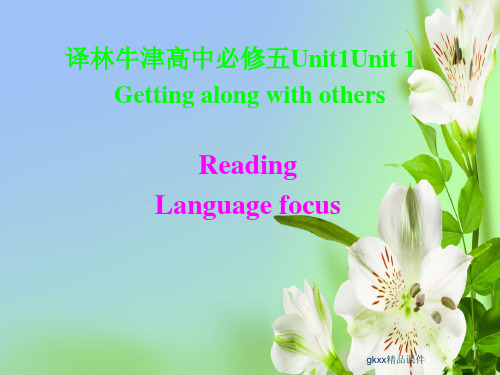
1. We have been good friends since primary
school. (line7)
(prep.)
(1). Unemployment in that country is now at its lowest level since WWII.该国的失业率 处于二战以来的最低水平。
2). I write not just for the pay, but for fun.(乐趣). We had a lot of fun at the party.
3). They often make fun of me for this.
gkxx精品课件
Don’t make_____of the blind man. A. fun B. funs C. funny D. a fun fun 做名词时不可数, 不能与a连用,也没 有复数形式。
park.
我们想要一
个能居高临下看到花园而不是停车场的房
间。
gkxx精品课件
6.I was determined to be cheerful.(line14)
(1) adj. 下了决心的
a. He is determined to take part in the international speech competition.
gkxx精品课件
(2). may have done (it’s not certain) Something may have happened to her. 可能她发生了什么事。
4. feel like (have a desire for) (line11-12)
gkxx精品课件
牛津译林版英语 高二上学期英语必修五Unit1知识点梳理
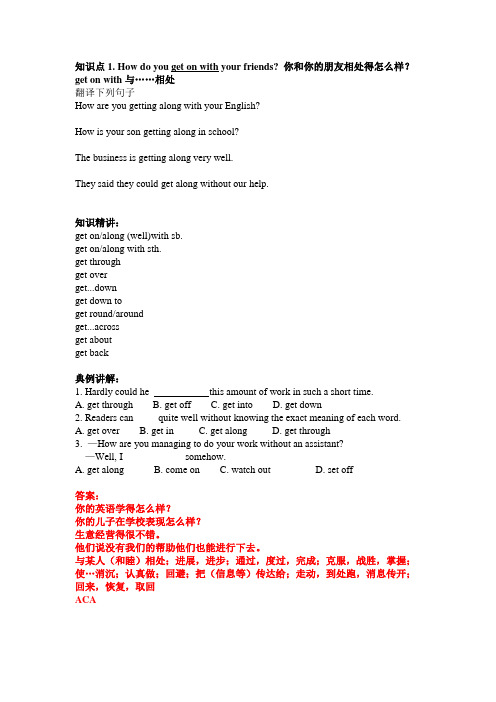
知识点1. How do you get on with your friends? 你和你的朋友相处得怎么样?get on with与……相处翻译下列句子How are you getting along with your English?_____________________________________________How is your son getting along in school?_____________________________________________The business is getting along very well._____________________________________________They said they could get along without our help._____________________________________________知识精讲:get on/along (well)with sb. _______________________get on/along with sth. _______________________get through _______________________get over _______________________get...down _______________________get down to _______________________get round/around _______________________get...across _______________________get about _______________________get back _______________________典例讲解:1. Hardly could he this amount of work in such a short time.A. get throughB. get offC. get intoD. get down2. Readers can ____ quite well without knowing the exact meaning of each word.A. get overB. get inC. get alongD. get through3. —How are you managing to do your work without an assistant?—Well, I____________ somehow.A. get alongB. come onC. watch outD. set off答案:你的英语学得怎么样?你的儿子在学校表现怎么样?生意经营得很不错。
牛津译林版高中英语必修五Unit1Gettingalongwithothers重点词汇讲解

重点词汇讲解1. worth / worthybe worth + money ( the price) 值……钱be (well / better) worth doing sth. (很)值得做某事(worth前的修饰副词只能用well,不可以用very, much等)be worthy of sth. / of being done / to be done1) The trip was expensive but it was worth every penny.这次旅行花费很大,但是花的每一分钱都不冤枉。
2) The book is worth reading. = it is worth reading this book.这本书值得一读。
2. fun u./n.乐趣;有趣的人/ 物funny adj.滑稽的有趣的1) It’s great fun talking with you. 和你交谈很愉快。
2) What fun it is to meet so many new friends!与到这么多新朋友是多么愉快的事啊!3) He is good fun; we all enjoy being with him.他是个有趣的人,我们都喜欢跟他在一起。
3. say=read ……上说/写着1) I found a sign which read/said ‘NO PARKING’.我发现一块告示,上面写着: “不准停车”。
2) When I returned home, I found a note pinned on my door saying that I should go to attend a meeting that afternoon.当我回到家时,我发现门上钉着一张便条,通知我下午去开会。
4. pretend vt./vi. 假装pretend sth./to do/ that从句1) When I went in, he pretended to be reading a book.我进门时,他假装正在看一本书。
牛津译林版高中英语必修5 Unit 1grammar(共31张PPT)
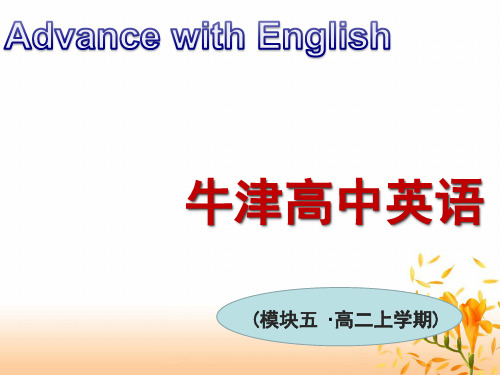
Different forms of To-infinitive
不定式还有进行形式(to be doing) 和完成形式(to have done)
They seem to be reading in the library. (动词不定式to be reading表示动作read正在发生)
I’m sorry to have said that. (动词不定式to have said that表示动作say发生在过去,
(3)当两个动词不定式由and, or, than, rather than, as或 like相连接时,通常第二个不定式要省略to。例如:
• Do you want to go skating or see a film? • I decided to write rather than phone.
when something unpleasant happens is
very important if we are to keep the
friendship.
predicative
2. We should always remind ourselves to
trust our friends whatever happens.
C. played
D. to play
10.---What do you think of the school? ----It is a very good _____.
A.school to study in B. school for children to study C. studying school D. school to study
6. 作状语
牛津译林版高中英语必修5Unit 1Getting along with othersWord power文字素材1

模块五Unit1 Getting along with others 【考点透视】I 重点短语betray sb. / sth.:betray me / my trust / one’s country / one’s faith …1. betray betray … to ….:betray a friend to an enemybetray the news / the secret …a stupid per son / idea / mistake …2. stupid It’s stupid of sb. to do sth.foolish / sillyoverlook a mistake / a person’s fault3. overlook overlook a valley from a hilla tower overlooking the citydetermine to do sth.be determined to do sth. / that …4. determine a determined mind / man…. , determined to do …determination: n.:come to a determination; declare / show determinationadmitted / admitting / admissionadm it one’s mistake / one’s guiltadmit doing sth. / that …5. admit admit sb. / sth. to be …admit sb. to / into a placeadmission:n. 许可:gain / obtain admission to / into a clubswear- swore - swornswear f riendship forever / swear eternal love to sb. ….6. swear swear to do… / that …swear to doing sth.forgive - forgave - forgiven7. forgive forgive (one’s doing) sth.forgive sb. for doing sth.8. focus focus one’s eyes / attention / the camera on …be focused on ……;类似用法:concentrate ….on….;fix ….on….a guilty man / deed;find sb. guilty9. guilty be guilty of (doing) sthfeel / be guilty about / over / forguilt:n. admit / deny one’s guiltbe cruel to sb10. cruel 类似用法:be kind to ….;be friendly to ….;be good to sb….;It’s cruel of sb. to do sth.;n. crueltystand the pain / hot weather11. stand stand working with sb.The coat doesn’t stand washing.区别bear:bear the weight;bear the responsibilityput up with sb. / sth.12. apologize apologize to sb. for sth.n. apology:make an apology to sb. for sth.Sb. be likely to do sth.It is likely that …13. likely Very / Most likely sb. will do sth.unlikely区分:likely / possibly / probablyblame sb. for (doing) sth.24. blame be blamed for ….sb. be to blame类似用法:thank sb. for (doing) sth.;punish sb. for (doing) sth. ….have a gift / gifts for sth.15. gift be gifted at sth. = have a gift / gifts for sth.a gifted studentgift 与talenthave / take a …attitude to / towar ds sb./ sth.16. attitude an official attitudeone’s attitude of mindabsorb light / knowledge …17. absorb absorb one’s attention / one’s energy / people …be absorbed in…hesitate about / in / at / over doing sth.18. hesitate hesitate to do sth.without any hesitation.have hesitation in doing sth.II 重点句型1. I thought it would be quite easy ….2. I must have sounded very proud of myself …3. How they must have laughed behind my back!4. Speaking of friends, I’ve met some nice people here in London.5. I can’t wait to see you again.6. Regardless of what these friendships are based upon, shared feelings or activities, ….【题例精析】【例1】No one has _____ been able to trace the author of the poem.A. stillB. yetC. alreadyD. just【易错点悟】考查副词用法。
Unit 1 单元重点小结 牛津译林版必修5同步课件

要做好主旨大意题,还应了解主旨大意题干扰项的特点,有助于迅 速、果断地排除这些干扰项,从而确定正确的答案。通常情况下, 干扰项具有如下五个特点: ①主题变大。干扰项所归纳、概括的范围变大,超过文章实际所提 及的内容。 ②断章取义。干扰项常以文章中的个别信息或个别字眼作为选项 的设计内容,或者以次要的事实或细节充当全文的主要观点。 ③以偏概全。干扰项只表述了文章的部分内容,也就是文章的局部 信息。 ④无中生有,似是而非。有的干扰项中的关键词语好似在文章中谈 到了,但认真分析之后会发现这类干扰项的内容与文章的内容毫无 联系。 ⑤张冠李戴。命题者有意地把属于A的特征放在B的身上,构成一 个干扰项。在我们不注意的情况下,会造成错选答案。
(1)细节理解题 细节理解就是事实询问题,一般就文中的某句、某段、某一具体细 节和事实进行提问,并要求作答的题型。题型多种多样,几乎没有 固定的模式,通常以what,who,which,where,when,how,why 等词引出 要考查的题目。此类题目在高考阅读试题中占的比例较大,做好这 类题目要掌握下列方法和技巧: ①弄懂题干和每个选项的含义,带着问题去阅读,做到有的放矢。 题意不明,当然无法做出正确选择,明确题意才能顺藤摸瓜。只要 仔细阅读,此类问题的答案都可以在阅读材料中找到相对应的文字 和语段作为验证。 ②按照题目的要求寻找与之相关的细节,正确估计答案来源。有的 题只要抓住文章的某处信息,即可找到正确答案。有的则需要综合 文章多处信息加以分析,才能找到解题思路。
others,but there are times that I do want to talk.I just don’t know
what to talk about and how to begin a conversation. I feel so lonely.How I wish I had a good friend!
译林牛津版高中英语必修五知识讲解 Unit 1 Getting along with others 语言点(1)
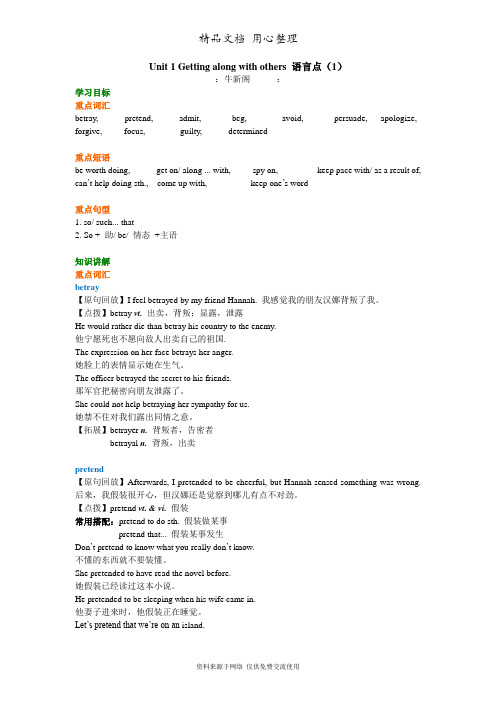
Unit 1 Getting along with others 语言点(1):牛新阁:学习目标重点词汇betray, pretend, admit, beg, avoid, persuade, apologize, forgive, focus, guilty, determined重点短语be worth doing, get on/ along ... with, spy on, keep pace with/ as a result of, can’t help doing sth., come up with, keep one’s word重点句型1. so/ such... that2. So + 助/ be/ 情态+主语知识讲解重点词汇betray【原句回放】I feel betrayed by my friend Hannah. 我感觉我的朋友汉娜背叛了我。
【点拨】betray vt.出卖,背叛;显露,泄露He would rather die than betray his country to the enemy.他宁愿死也不愿向敌人出卖自己的祖国.The expression on her face betrays her anger.她脸上的表情显示她在生气。
The officer betrayed the secret to his friends.那军官把秘密向朋友泄露了。
She could not help betraying her sympathy for us.她禁不住对我们露出同情之意。
【拓展】betrayer n.背叛者,告密者betrayal n.背叛,出卖pretend【原句回放】Afterwards, I pretended to be cheerful, but Hannah sensed something was wrong. 后来,我假装很开心,但汉娜还是觉察到哪儿有点不对劲。
译林版必修第五册unit1 语言知识点总结归纳
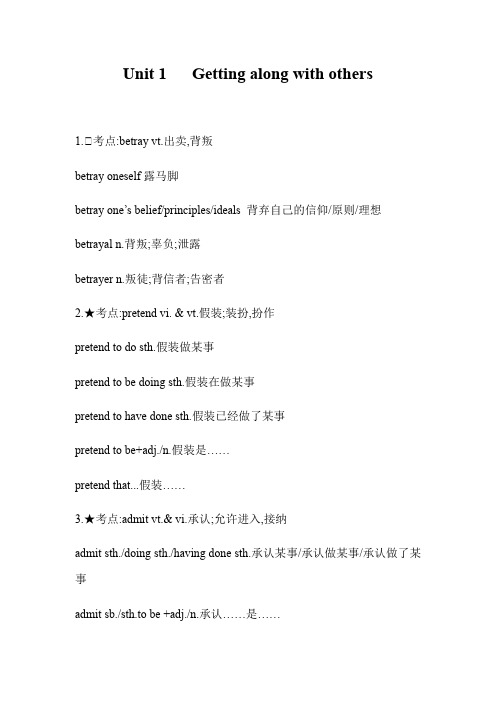
Unit 1 Getting along with others1.★考点:betray vt.出卖,背叛betray oneself露马脚betray one’s belief/principles/ideals 背弃自己的信仰/原则/理想betrayal n.背叛;辜负;泄露betrayer n.叛徒;背信者;告密者2.★考点:pretend vi. & vt.假装;装扮,扮作pretend to do sth.假装做某事pretend to be doing sth.假装在做某事pretend to have done sth.假装已经做了某事pretend to be+adj./n.假装是……pretend that...假装……3.★考点:admit vt.& vi.承认;允许进入,接纳admit sth./doing sth./having done sth.承认某事/承认做某事/承认做了某事admit sb./sth.to be +adj./n.承认……是……admit that...承认……admit sb.to/into...允许某人进入某处be admitted as...作为……被接受be admitted into被录取;被批准(入党、入团)It is widely admitted that...公认……4.★考点:so + adj./adv.+ that 如此……以至于……so+adj./adv.+that...so+adj.+a(n)+n.+that...so+many/few+复数名词+that...so+much/little+不可数名词+that...such+a(n)+adj.+n.+that...such+adj.+不可数名词+that...such+adj.+名词复数+that...5.★考点:must have done 一定做了某事(表示对过去已发生事情的肯定推测)与must have done用法类似的还有:ought to/should have done(过去)本应该做某事oughtn’t to/shouldn’t have done(过去)本不应该做某事could have done sth.本来能够做某事,而实际上未做can’t/couldn’t have done sth.不可能做过某事may/might have done sth.可能已经做了某事/也许已经做了某事needn’t have done sth.本来不必做某事6.★考点:keep one’s word 信守诺言keep one’s word信守诺言break one’s word失信eat one’s word食言keep one’s mind 集中精力keep one’s head保持冷静keep one’s company陪伴某人keep one’s balance保持平衡have a word with sb.与某人交谈have words with sb.与某人争吵in other words换句话说in a word总之;一句话word for word逐字地7.★考点:swear vt.& vi.(swore,sworn)发誓;郑重承诺;咒骂,说脏话swear by...向……发誓swear to do sth.发誓干某事swear at sb.咒骂某人,诅咒某人8.spy on 暗中监视,窥探spy out 暗中查明9.★考点:forgive vt. 原谅,宽恕forgive me 请原谅;对不起forgive sb.for (doing) sth. 原谅某人(做了)某事forgive one’s doing sth. 原谅某人做了某事forgive and forget 不念旧恶,不记仇pardon sb.for doing sth./excuse sb.for doing sth.原谅某人做了某事10.★考点:focus vi. & vt. 集中注意力于……;(使)聚焦focus on (upon)集中于;聚焦于focus one’s attention/efforts/mind/energy on 把注意力/努力/心思/精力集中于……in focus 焦距正确;图像清晰out of focus 不在焦距上;图像不清晰bring/throw sth.into focus 使某事成为焦点,使某事受到关注11.as a result of 由于,因为as a result 结果;因此result from 由……产生(造成)result in 导致表示“因为,由于”的短语还有:owing to/because of/thanks to/due to/on account ofwith the result that为此;因此without result毫无结果12.be/feel guilty at/about/for 对……感到内疚be/feel guilty of 有……过错,犯了……罪be/feel guilty doing... 干了……感到内疚13.★考点:cruel adj. 伤人的;残酷的,残忍的be cruel to sb./sth.对……残酷(残忍)be kind to sb.对某人友善It is cruel (kind) of sb.to do sth.某人做某事是残忍的(友善的)14.★考点:remark n.& vi. 评论,谈论make a remark on 就……发表意见,对……品头评足pass without remark 置之不理,置若罔闻,默认remark on/upon 谈论,议论,评论remarkable adj. 卓越的,值得注意的15.★考点:argue vi.争吵,争论vt.论证;争辩argue with sb.about/over sth.= argue about/over sth.with sb.关于某事和某人争论argue for/against 提出理由支持/反对argue sb.into/out of doing sth.通过争论使某人(不)做某事beyond argument 无可争辩16.★考点:apologize vi.道歉apologize to sb.for (doing) sth.因(做)某事向某人道歉make/offer an apology to sb.for sth.因某事向某人道歉accept/refuse one’s apology 接受/拒绝某人的道歉owe sb.an apology 欠某人一个道歉oral/written apology 口头/书面道歉17.★考点:quarrel n. 争吵,争执have a quarrel with sb.over/about sth.因某事和某人争吵quarrel with sb.about/over sth.因某事和某人争吵18.★考点:sensitive adj.易生气的;敏感的;体贴的be sensitive to 对……敏感be sensitive about 对……体贴be allergic to 对……过敏19.if any如果有的话if necessary 如果必要的话if ever 如果曾经有的话if not 如果不是这样的话if possible如果有可能20.★考点:blame vt.责备,指责blame sb.for (doing) sth.因(做)某事而指责某人blame sth.on sb.因某事而指责某人sb.be to blame for (doing) sth.某人因(做)某事应该受到谴责bear/take/accept/get the blame for sth.对某事承担责任lay/put the blame on sb.把某事归咎于某人注意:be to blame应负责,该受责备,为不及物动词短语,无被动形式。
牛津译林版高二英语模块五第一单元unit1重点单词精析-word
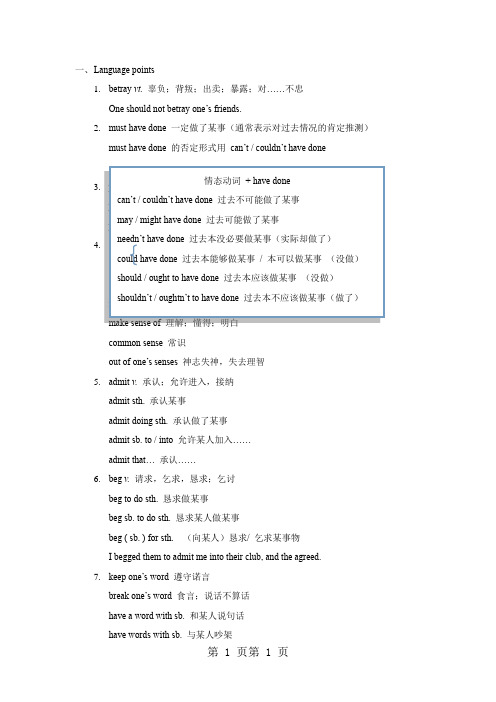
一、L anguage points1.betray vt.辜负;背叛;出卖;暴露;对……不忠One should not betray one’s friends.2.must have done 一定做了某事(通常表示对过去情况的肯定推测)must have done 的否定形式用can’t / couldn’t have done3.4.common sense 常识out of one’s senses 神志失神,失去理智5.admit v.承认;允许进入,接纳admit sth. 承认某事admit doing sth. 承认做了某事admit sb. to / into 允许某人加入……admit that…承认……6.beg v.请求,乞求,恳求;乞讨beg to do sth. 恳求做某事beg sb. to do sth. 恳求某人做某事beg ( sb. ) for sth. (向某人)恳求/ 乞求某事物I begged them to admit me into their club, and the agreed.7.keep one’s word 遵守诺言break one’s word 食言;说话不算话have a word with sb. 和某人说句话have words with sb. 与某人吵架in a word 一句话;简言之in other words 换句话说8.forgive v.原谅,宽恕;饶恕forgive sb. for ( doing ) sth. 原谅某人(做)某事excuse sb. for ( doing ) sth. 原谅某人(做)某事thank sb. for ( doing ) sth. 因为(做)某事而感谢某人praise sb. for ( doing ) sth. 因为(做)某事而表扬某人punish sb. for ( doing ) sth. 因为(做)某事而惩罚某人scold sb. for ( doing ) sth. 因为(做)某事而责备某人9.focus v.(使)聚焦,(使)集中n. 焦点,重点focus on 集中于focus…on…把……集中于……10.keep pace with 与……步调一致/同步keep up with 跟上,与……同步前进catch up with 赶上11.as a result of 由于result in 导致(接结果)result from 因……而引起(接原因)as a result 结果as a consequence of 由于12.manner n. 方式,方法;态度,举止in a/ an … manner 以……方式in a/ an … way 以……方式13.accuse sb. of sth. 因某事指责/控告某人accuse sb of doing sth. 指责/控告某人做了某事charge sb. with ( doing ) sth. 指控某人(做了)某事blame sb. for ( doing ) sth. 责备某人(做了)某事14.guilty adj.内疚的,羞愧的;犯罪的,有罪的be guilty about/ at 对……感到内疚/羞愧be guilty of 犯……罪/错误15.remark n. 评论,谈论,言语;意见v. 评论,谈论,谈及remark on/ upon…谈论/评论……remark that…评论……make a remark on/ upon …评价…….16.argue v.争论,争吵;说服;力劝argue with sb. about/ over sth. 同某人争论某事argue against 据理反对;证明……是不成立的argue for 为……而辩论argue sb. into/ out of doing sth. 力劝某人做/不做某事17.apologize vi. 道歉;谢罪apologize to sb. for ( doing ) sth. 因(做了)某事而向某人道歉make/ offer an apology ( to sb. for sth. ) (因某事向某人)表示歉意accept/ refuse an apology 接受/ 拒绝道歉18.quarrel n. & vi.争吵,争执,吵架have a quarrel with sb. about/ over sth. 因为某事与某人争吵quarrel with sb. about/ over sth.19.sensitive adj.敏感的;容易生气的;善解人意的,体恤的be sensitive to/ about sth. 对某物/某事敏感20.envy vt. & n. 羡慕;忌妒envy sb. sth. 羡慕某人某事(后接双宾语)the envy of sb. 令某人忌妒或羡慕的事物with envy 羡慕out of envy 出于羡慕,出于忌妒21.blame vt.责备,谴责n. (坏事或错误的)责任sb. be to blame 某人应该受责备blame sb. for 因……责备某人blame sth. on sb. 把某事归咎于某人take/ accept the blame for sth. 为某事承担责任put/ lay the blame on sb. 把责任归咎于某人22.gifted adj. 有天赋的,有天才的gift n.天资,天赋,天才,才能;礼物have a gift for 有……天赋23.disagreement n. 意见不一,争执,争论disagree with 不同意;意见不合;不一致;agree to do sth. 同意做某事agree on/ upon 就……达成一致意见24.before long 不久,不久以后long before 很久以前25.persuade v. 说服,劝说;(使)相信persuade sb. to do sth. 说服某人做某事persuade sb. not to do sth. 说服某人不做某事persuade sb. into doing sth. 说服某人做某事persuade sb. out of doing sth. 说服某人不做某事persuade sb. of sth. 使某人相信某事26.practical adj.实际的,实践的;实用的practice/ practice v. 练习,实践,实行practice n. 实行,实践,练习in practice 事实上put…into practice 付诸实践27.overcome v.克服,解决;战胜overcome one’s shortcomings 克服缺点overcome difficulties 战胜困难overcome one’s shortcoming by learning from other’s strong points 取人之长,补己之短28.get through 打通(电话);到达;及格;用完;通过,度过;完成get across 被理解;把……讲清楚get along 设法度过;相处,进展get away 离开get down to 开始做(to为介词)get around 到处走动,传播出去29.curious adj. 好奇的,渴望知道的;奇特的,古怪的be curious about sth. 对某事感到好奇be curious to do sth. 很想做It is curious that…真是奇怪……with curiosity 好奇地out of curiosity 出于好奇30.attitude n.态度,看法one’s attitude to/ towards 某人对待……的态度31.be based on 建立在……基础之上,以……为基础32.cautious adj.谨慎的,小心的be cautious about/ of/ with 对……小心/谨慎be cautious about doing sth. 对做某事持谨慎的态度33.share v.分享,共有,分配share sth. between/ among sb. 与某人分享/分配某物share sth. with sb. 和某人分享某物;和别人合用某物share in sth. 分摊/共同承担/分享某物share the joys and sorrows 同甘共苦34.eager adj.热切的,急不可待的be eager to do sth. 渴望做某事be eager for sth. 渴求某事35.hesitate v.犹豫,踌躇hesitate to do sth. 对做某事犹豫不决hesitate about/ over/ at doing sth. 对做某事犹豫不决without hesitation 毫不犹豫地36.respond v.回应,答复,回答,做出反应respond to 对……做出反应respond that…回答说……in response to 回答,回应make/ give no response to 没做答复37.pause vi. & n.暂停,中止,停顿pause for 停下……pause to do sth. 停下来做某事38.regardless of 不管,不顾in regard to 关于give my regards to sb. 代我问候某人remember me to sb.39.imagine vt.想象,设想imagine doing sth. 设想做某事imagine sb. to be 想象某人是imagine that…设想……beyond imagination 难以想象40.end up 最后成为,最后有某种结局,结束end up doing 最终做……end up with 以……结束end up as 作为……结束end up in 以……告终,结果……41.mean to do sth. 打算/意欲做某事mean doing sth. 意味着做某事mean sb. to do sth. 打算使/让某人做某事by all means 当然可以by this means 通过这种方式42.mercy n.仁慈,宽恕,怜悯;恩惠,幸运have mercy on sb. 宽恕或怜悯某人show mercy to sb. 宽恕或怜悯某人give mercy to sb. 宽恕或怜悯某人at the mercy of 在……掌握之中,任由……摆布without mercy 毫不留情地It is mercy that…真是幸运……。
译林牛津版高二英语必修五unit1 知识点及语法总结(完整资料).doc
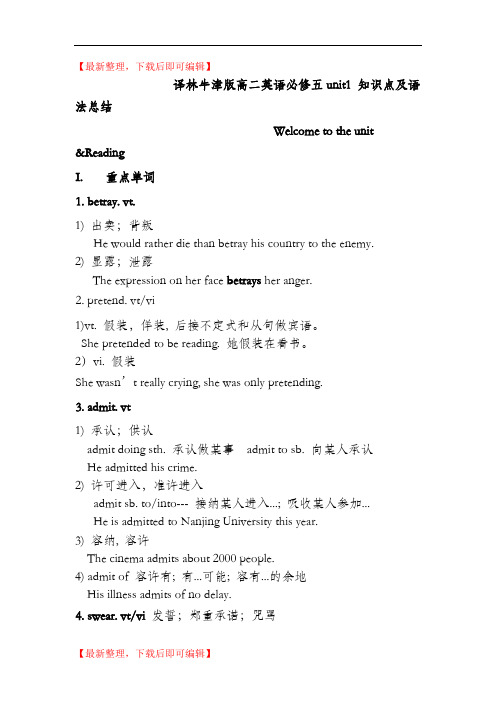
【最新整理,下载后即可编辑】译林牛津版高二英语必修五unit1 知识点及语法总结Welcome to the unit&ReadingI.重点单词1. betray. vt.1) 出卖;背叛He would rather die than betray his country to the enemy.2) 显露;泄露The expression on her face betrays her anger.2. pretend. vt/vi1)vt. 假装,佯装, 后接不定式和从句做宾语。
She pretended to be reading. 她假装在看书。
2)vi. 假装She wasn’t really crying, she was only pretending.3. admit. vt1) 承认;供认admit doing sth. 承认做某事admit to sb. 向某人承认He admitted his crime.2) 许可进入,准许进入admit sb. to/into--- 接纳某人进入...; 吸收某人参加...He is admitted to Nanjing University this year.3) 容纳, 容许The cinema admits about 2000 people.4) admit of 容许有; 有...可能; 容有...的余地His illness admits of no delay.4. swear. vt/vi 发誓;郑重承诺;咒骂swear to sb. / swear that 从句向某人承诺发誓swear—swore ---sworn5. focus. n/vt/vi1) n. 焦点,注意力put focus on 集中注意力于…..2) vi/vtfocus on集中注意力于….近义词组:concentrate onpay full attention todevote … to6. guilty. adj 有罪的1) be guilty of “犯了……罪”In the process of gaining our rightful place, we must not be guilty of wrongful deeds.2)be found guilty 被判决有罪Maggie could be sentenced to up to three years in prision if (he was) found guilty.7. remark. Vt / n 评论make remarks on sth = make comments on sth对…作出评论8. apologize. vi 道歉apologize to sb=make an apology to sb 向某人道歉9. sensitive. adj 敏感的;体贴的be sensitive to 对…体贴,敏感10. blame. n/vt 责备1) n. put blame on sb 责备某人2) vt. blame sb for sth 因某事责备某人blame sth on sb 把某事归咎于某人He blamed his faiure on his teacher.sb be to blame= sb should be blamed 主动形式表被动You are to blame. 你应该受责备。
高二英语必修5知识点和语法总结

高二英语必修 5 知识点和语法总结英语是一种西日耳曼语,在中世纪早期的英国最早被使用,并因其广阔的殖民地而成为世界使用面积最广的语言。
下面给大家带来一些关于高二英语必修 5 知识点和语法总结,希望对大家有所帮助。
Unit 1:1. put forward: 提出(计划、建议等);将…提前;把钟表拨快e.g. He put forward a good plan for this project. 他为这项工程提出了一个好的方案。
The match has been put forward to 1:30. 比赛已经提前到一点半举行。
Put the clock forward by ten minutes. 把钟表拨快十分钟。
【词语联想】put away: 收起来;贮存,储蓄put down: 放下;写下,记下put off: 推迟;延期put on: 穿上;增加;上演(戏剧)e.g. put on weight: 增加了体重 put on a new play: 上演新戏剧put up: 张贴;撑开(帐篷)e.g. put up a poster put up a tent: 搭起帐篷2. conclude: v. 作结论,断定(conclusion: n. 结论)e.g. The jury concluded that he was guilty. 陪审团认定他有罪。
【习惯用语】★ draw a conclusion 作出结论3. defeat vt.打败, 击败, 战胜; 使(希望, 计划等)失败, 挫败; 阻挠, 使无效e.g. He finally conceded defeat. 他最终承认了失败。
◆区别: defeat, conquer, overcomedefeat 指“赢得胜利”, 尤其指“军事上的胜利”,e.g. defeat the enemy 打败敌人。
conquer 指“征服” 、”战胜”,特别指“获得对人、物或感情的控制”,e.g. conquer natureovercome 指“战胜” 、“压倒” 、“克服”尤指“感情”而言, e.g. overcome difficulties4. attend: v.1) to be present at ; go to (meeting, conference, lecture...) 出席 ; 参加e.g. He decided to attend the meeting himself. 他决定亲自赴会。
牛津译林版高中英语必修5+Unit+1+Period+Four(共72张PPT)

9.in conclusion
总之
10.look back on
回忆
答案
好句积累 1.When asked,they usually hesitate before responding,‘My best friend? I can’t think about that...’ 当被问及这个问题的时候,他们往往在回答之前都要犹豫一下,“我最要 好的朋友?我可没想过……” 2.The important thing to remember is that both of them are friendships. 需要记住的重要的一点是:这两者都是友谊。 3.However,if I had ended our friendship,we would have both learnt nothing. 但是,如果当初我终止了我们的友谊,那我们俩都会一无所得。
6、does not mean teaching people to kow what they do not know ; it means teachng them to behave as they do not behave. 教育不在于使人知其所未知,而在于按其所未行而行。2021年11月2021/11/242021/11/242021/11/2411/24/2021
重点短语
1.be based on
以……为基础,以……为根据
2.be anchored in
基于,扎根于
3.regarend up
最终处于;最后成为
5.rely on
指望,依赖,依靠
6.thanks to
幸亏;由于
7.be committed to
对……尽心尽力
牛津译林版高二英语模块五第一单元unit1重点单词精析

preten.t.d.sth..t.b.doin.sth.假装做某..正在做某事
pretend that…假装……
sens. vt.感到;理解;认识
n.官能,感觉,判断力,见识
a sense of…
make sense有意义,有道理
make sense of理解;懂得;明白
b.curiou.abou.sth.对某事感到好奇
b.curiou.t.d.sth.很想做
It is curious that…真是奇怪……
with curiosity好奇地
out of curiosity出于好奇
attitud.n.态度,看法
one’s attitude to/ towards某人对待……的态度
common sense常识
2.out of one’s senses神志失神,失去理智
admi.v.承认;允许进入,接纳
admi.sth.承认某事
admi.doin.sth.承认做了某事
admi.sb.t..int.允许某人加入……
admit that…承认……
be.v.请求,乞求,恳求;乞讨
be.t.d.sth.恳求做某事
....n.焦点,重点
focus on集中于
focus…on…把……集中于……
5.keep pace with与……步调一致/同步
keep up with跟上,与……同步前进
catch up with赶上
6.as a result of由于
result in导致(接结果)
result from因……而引起(接原因)
as a result结果
as a consequence of由于
模块5 Unit 1 Getting along with others全单元语言点(译林牛津版高二

模块5 Unit 1 Getting along with others全单元语言点(译林牛津版高二英语必修五教案教学设计)Welcome to the unit1. practise vt. 练习He is practising the piano now.We often practise speaking English among ourselves.2.get along/ on1). 进展 get along withHow are you getting along with your computer?We can’t get along well without courage.2). 相处融洽 get along withMy cat is getting along well with my dog.My family are getting along well with my neighbors.3. be worth 值得1) Be worth+名词I paid only 10 yuan for the book, but is worth much more.The book is worth 10 yuan.2) be worth + doing 表被动含义The book is well worth reading.留意:be worthy of + 名词或 being done be worthy to be done The experiment is worthy of careful try.The experiment is worthy of being tried.The experiment is worthy to be tried.4. What do you think are most important characteristics ina friend?Wh + do you think + 其他部分用以征询对方的看法或推想等。
高二英语必修5知识点和语法总结

高二英语必修5知识点和语法总结英语是一种西日耳曼语,在中世纪早期的英国最早被使用,并因其广阔的殖民地而成为世界使用面积最广的语言。
下面给大家带来一些关于高二英语必修5知识点和语法总结,希望对大家有所帮助。
Unit 1:1. put forward: 提出(计划、建议等);将…提前;把钟表拨快e.g. He put forward a good plan for this project. 他为这项工程提出了一个好的方案。
The match has been put forward to 1:30. 比赛已经提前到一点半举行。
Put the clock forward by ten minutes. 把钟表拨快十分钟。
【词语联想】put away: 收起来;贮存,储蓄put down: 放下;写下,记下put off: 推迟;延期put on: 穿上;增加;上演(戏剧)e.g. put on weight: 增加了体重 put on a new play: 上演新戏剧put up: 张贴;撑开(帐篷)e.g. put up a poster put up a tent: 搭起帐篷2. conclude: v. 作结论,断定(conclusion: n. 结论)e.g. The jury concluded that he was guilty. 陪审团认定他有罪。
【习惯用语】 draw a conclusion 作出结论3. defeat vt.打败, 击败, 战胜; 使(希望, 计划等)失败, 挫败; 阻挠, 使无效e.g. He finally conceded defeat. 他最终承认了失败。
◆ 区别: defeat, conquer, overcomedefeat 指“赢得胜利”, 尤其指“军事上的胜利”,e.g. defeat the enemy 打败敌人。
conquer指“征服”、”战胜”,特别指“获得对人、物或感情的控制”,e.g. conquer natureovercome指“战胜”、“压倒”、“克服”尤指“感情”而言,e.g. overcome difficulties4. attend: v.1) to be present at; go to (meeting, conference, lecture...) 出席;参加e.g. He decided to attend the meeting himself. 他决定亲自赴会。
牛津译林版必修五unit1重点句子句型总结

Unit1重点句子句型1. Almost everyone wants to make friends and develop friendships with other.2. Friends are thieves of time.3. The best mirror is an old friend.4. If you can buy a person friendship, it is not worth having.5. True friends have hearts that beat as one.6. I feel betrayed my friend Hannah.7. We are both very academic and like to studying, but we like it that way.8. I thought it was quite easy and was not worried about the results.9 I pretended to be cheerful but Hannah sensed that something was wrong.10. I noticed that my classmate was staring at me as I came into math class.11. I was shocked to find a piece of paper on my desk12. I was so upset that I felt like crying13 I begged her not to tell anyone else and she said she would keep my secret14 I was so angry that I went straight to Hannah and told her we weren’t going to be friends anymore because she couldn’t keep her word15. I don’t think I can ever truly forgive her16. My best friend Matthew has stopped talking to me17. We had an important match against another school18. I was determined to win but Matthew was playing badly19. I got really angry with him20 we both started shouting at each other and it turned into a horrible argument21 He accused me of some really bad things just to hurt me22 I feel really guilty because I made some cruel remarks too.23. I dislike seeing our team lose.24 football is important to me , but so is our friendship25. Since we argued, he hasn’t spoke to me even though we sit next to each other in class26 I cannot help wondering if he wants Peter to be his best friend instead of me27. I’m really athletic and good at football28 You had better find another friend29 I thought he was not trying hard enough.39. It seems that you need to apologize quickly to avoid losing a good friend40 shouting at him just made him feel worse41 you should talk to your friend and I’m sure that you will be backplaying football together42 if you really sense that she wanted to embarrass you in public, you had better find a new friend。
牛津译林版高中英语必修五Unit1Gettingalongwithothers语法
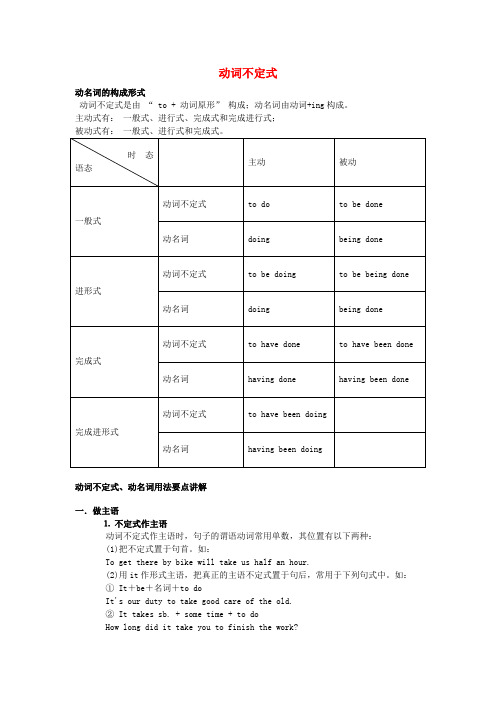
动词不定式动名词的构成形式动词不定式是由“ to + 动词原形”构成;动名词由动词+ing构成。
主动式有:一般式、进行式、完成式和完成进行式;被动式有:一般式、进行式和完成式。
时态主动被动语态动词不定式to do to be done一般式动名词doing being done动词不定式to be doing to be being done 进形式动名词doing being done动词不定式to have done to have been done 完成式动名词having done having been done动词不定式to have been doing完成进形式动名词having been doing动词不定式、动名词用法要点讲解一.做主语⒈不定式作主语动词不定式作主语时,句子的谓语动词常用单数,其位置有以下两种:(1)把不定式置于句首。
如:To get there by bike will take us half an hour.(2)用it作形式主语,把真正的主语不定式置于句后,常用于下列句式中。
如:① It+be+名词+to doIt's our duty to take good care of the old.② It takes sb. + some time + to doHow long did it take you to finish the work?③ It+be+形容词+for sb.+to doIt is difficult for us to finish writing the composition in a quarter of an hour.④ It+be+形容词+of sb.+to doIt is stupid of you to write down everything the teacher says.⑤ It seems(appears)+形容词+to doIt seemed impossible to save money.在句型③中,常用表示客观情况的形容词,如:difficult, easy, hard, important, impossible, necessary 等;在句型④中,常用careless, clever, good, foolish, honest, kind, lazy, nice, right, silly, stupid, wise等表示赞扬或批评的词。
- 1、下载文档前请自行甄别文档内容的完整性,平台不提供额外的编辑、内容补充、找答案等附加服务。
- 2、"仅部分预览"的文档,不可在线预览部分如存在完整性等问题,可反馈申请退款(可完整预览的文档不适用该条件!)。
- 3、如文档侵犯您的权益,请联系客服反馈,我们会尽快为您处理(人工客服工作时间:9:00-18:30)。
译林牛津版高二英语必修五unit1 知识点及语法总结Welcome to the unit &ReadingI.重点单词1. betray. vt.1) 出卖;背叛He would rather die than betray his country to the enemy.2) 显露;泄露The expression on her face betrays her anger.2. pretend. vt/vi1)vt. 假装,佯装, 后接不定式和从句做宾语。
She pretended to be reading. 她假装在看书。
2)vi. 假装She wasn’t really crying, she was only pretending.3. admit. vt1) 承认;供认admit doing sth. 承认做某事admit to sb. 向某人承认He admitted his crime.2) 许可进入,准许进入admit sb. to/into--- 接纳某人进入...; 吸收某人参加...He is admitted to Nanjing University this year.3) 容纳, 容许The cinema admits about 2000 people.4) admit of 容许有; 有...可能; 容有...的余地His illness admits of no delay.4. swear. vt/vi 发誓;郑重承诺;咒骂swear to sb. / swear that 从句向某人承诺发誓swear—swore ---sworn5. focus. n/vt/vi1) n. 焦点,注意力put focus on 集中注意力于…..2) vi/vtfocus on集中注意力于….近义词组:concentrate onpay full attention todevote … to6. guilty. adj 有罪的1) be guilty of “犯了……罪”In the process of gaining our rightful place, we must not be guilty of wrongful deeds.2)be found guilty 被判决有罪Maggie could be sentenced to up to three years in prision if (he was) found guilty. 7. remark. Vt / n 评论make remarks on sth = make comments on sth对…作出评论8. apologize. vi 道歉apologize to sb=make an apology to sb 向某人道歉9. sensitive. adj 敏感的;体贴的be sensitive to 对…体贴,敏感10. blame. n/vt 责备1) n. put blame on sb 责备某人2) vt. blame sb for sth 因某事责备某人blame sth on sb 把某事归咎于某人He blamed his faiure on his teacher.sb be to blame= sb should be blamed 主动形式表被动You are to blame. 你应该受责备。
11. gifted. adj = talented 有天赋的1) be gifted for/as 有…天赋2) have a gift for有…天赋II. 重点词组1.beg sb to do sth 恳求某人做某事2.stare at 凝视glare at 怒视gaze at 瞪眼看3.keep one’s word 守诺言break one’s word 食言have a word with 与…交谈have a words with 与…吵架4.feel like doing 想要做某事sound like 听起来像5.go straight to 径直去…6.spy on 监视watch over 看管7.keep pace with 与…协调一致keep up with 跟上8.as a result of 由于because of= due to=owing to 由于as a result 结果result in 导致result from 源于,由于9.turn into 转变成turn up 出现,出席turn out 结果是turn sb down 拒绝turn around 转身;逆转turn to 转向10.as well as和as well 也may as well 不如不妨11.shout at 朝…大喊( 生气,愤怒)shout to朝…大喊(指远处)12.make some cruel remarks 咒骂某人,说坏话13.even though即使14.can not help doing sth 禁不住做某事can’t help but do sth 只好做某事can’t help to do sth 不能帮助做某事15.accuse sb of sth指控某人某事inform.. of…告知approve… of 同意warn… of…警告III.重点句式1. I must have sounded very proud of myself after the quiz, saying how easy it was and howI was sure to get a good mark. (page 2)(1)“must+完成时”表示对过去事情语气比较肯定的推测。
对现在推测,用must be.They must have been laughing behind my back. (page 2)他们在我背后一定是笑得合不拢嘴。
①“must+完成时”结构的反义疑问句,疑问部分应根据must后的动词形式采用相应的形式,可用have (has),也可用did。
但若句中出现了过去时间状语,则只能用did。
He must have read it, hasn’t /didn’t he? 他一定读过它,是吗?He must have left yesterday, didn’t he? 他昨天一定走了,是吗?②表示推测的否定结构要用“can not /can’t”, 或者是can +其他具有否定意义的副词。
例如:You can’t be tired —you’ve only been working for an hour.你不可能疲倦,你只工作了一小时。
(2)….., saying how easy it was and how I was sure to get a good mark 是非谓语动词doing做原因状语;how easy it was and how I was sure to get a good mark 是how 引导的名词性从句做say的宾语。
2. I thought that Hannah must have told everyone about my grades after promising me not to.(page 2)1) must have told 表示对过去推测;2)after promising me not to=after she promised not to tell anyone.a. after引导的状语从句,当从句的主语she与主句的主语Hannah 一致时,从句的she 可以省略,同时从句的谓语动词promised 要变成非谓语形式promising;b. promising me not to 属于to do 不定式省略动词do 的情况,在某些动词后,如:promise, like, hope, want 等,为避免与上一句to do中的动词重复,可省略to后的动词。
3. I cannot help wondering if he wants Peter to be his best friend instead of me. (page 3)1)if he wants Peter to be his best friend instead of me为wonder 的宾语从句2)wonder vt. (对)...感到奇怪; 想知道,不知道①I wonder if/whether you…可用来客气地提出请求;wonder后可接其他连接词引导的宾语从句。
例如:I wonder if you’d give me some advice.I wonder who he is, where he came from and why he came.②wonder后可接“疑问词+动词不定式”作宾语:例如:They waited and wondered what to do.③there is no wonder that 从句:难怪…….There is no wonder that you were late for school, for your bike broke down.4. He accuse me of some bad things just to hurt me. (page 3)1) accuse sb of sth= charge sb with sth 指控某人….2)just to hurt me属于非谓语to do形式,在句中做目的状语,类似的词组还有:only to (表示出乎意料的结果),in order to/ so as to (表示目的)5. If so, the problem lies with you, not her.(page 5)(1) If so是个条件从句,so代替上文内容。
not也有同样用法,构成省略句式:if not。
又如:—She may not be free today. 她今天可能没空。
—If so, we’ll have to put the meeting off. 如果是这样,这会就得延后了。
Get up early tomorrow, if not (you don’t get up early), you will miss the first bus.明天你得早起,否则(你不早起),你会错过首班车。
(2)lie with“是……的责任;取决于”。
